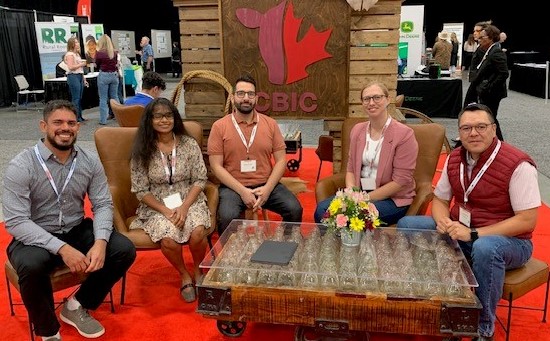Beef Researcher Mentorship Program Participants Announced for 2023-2024
Researchers are critical for the Canadian beef cattle industry. Engaging researchers who study cattle, beef, genetics, feed or forage production with industry leaders is mutually beneficial; these connections allow researchers to become better informed about industry needs and encourage sharing of research findings with a practical, solution-based focus.
The Beef Cattle Research Council (BCRC) Beef Researcher Mentorship Program provides opportunities for new researchers to be paired with two mentors who provide insights and experiences that are relevant to their careers. The program also provides a travel budget to attend industry events and actively participate in the mentorship experience.
Following an open application process, four researchers from across Canada have been selected this year. Each has been paired with notable leaders in the Canadian beef industry, which will provide valuable opportunities for greater engagement across the industry.
Outgoing 2022-23 mentees pictured at the 2023 Canadian Beef Industry Conference held August 14-19 in Calgary, Alberta. From left to right: Dr. Erik Santos, Dr. Nilusha Malmuthuge, Dr. Antonio Facciuolo, Dr. Emily Snyder and Dr. Juan Hernandez-Medrano.
The BCRC is pleased to announce the following participants in the 2023-2024 Beef Researcher Mentorship Program:
Mentee: Dr. Bree Kelln
Mentors: Andrea Brocklebank and Dr. Murray Jelinski
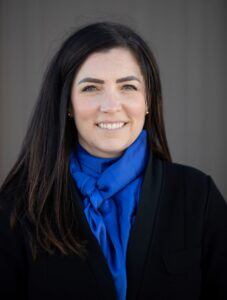
Dr. Bree Kelln was raised on and continues to farm a mixed farm with her husband and son near Duval, SK. Bree obtained a B.S.A. (’05), M.Sc. (’10) and Ph.D. (’22) from the University of Saskatchewan Department of Animal and Poultry Science. Throughout this time, she worked in various industry roles involved in agronomy, livestock and extension. Her Ph.D. program focused on the inclusion of bloat-free legumes into existing pasture stands to improve productivity. This project used a systems approach to evaluate the effects of sod-seeded, bloat-free legumes (sainfoin and cicer milkvetch) on pasture productivity, animal performance, rumen fermentation, greenhouse gas emissions and system economics. Recently, Bree was selected as the Beef Industry Integrated Forage Management and Utilization Chair for the University of Saskatchewan, where she holds a joint appointment in the departments of Plant Science and Animal & Poultry Science.

Andrea Brocklebank is the executive director of the BCRC. She has worked in various roles within the Canadian Cattle Association (CCA) over the last 18 years. As executive director, she oversees the delivery of the BCRC’s research and extension programming and delivery of Verified Beef Production Plus (VBP+) training and on-farm certification. Andrea completed a B.A. in Agricultural Studies at the University of Lethbridge and a M.Sc. in Agricultural Economics at the University of Saskatchewan. Prior to working with the CCA, she worked within the Canadian cattle feeding sector and in agriculture finance. Andrea and her husband Brad manage a farming operation near High River, AB, that includes rotational grazing cattle on both tame and native grasslands and grain farming. They have two sons and are very involved in the local 4-H beef club, lacrosse league and other community activities.

Upon graduating with his DVM in 1985, Dr. Murray Jelinski established a mixed animal practice in Moosomin, SK. Following seven years in practice, he returned to the Western College of Veterinary Medicine (WCVM) to complete a M.Sc. degree in 1995. He then worked 10 years in the Canadian veterinary pharmaceutical industry, starting as manager of regulatory affairs and product development and ending as general manager for MetaMorphix Canada Inc. In 2005, he joined the WCVM as the Alberta Chair in Beef Cattle Health and Production Medicine. Murray has a broad-based research program that involves investigating pneumonia and lameness in feedlot cattle, internal parasites in pastured yearling cattle, antimicrobial resistance and the changing demographics of the veterinary profession in Western Canada.
Mentee: Dr. Francois Teste
Mentors: Laura and Mark Hoimyr and Kevin Steinley
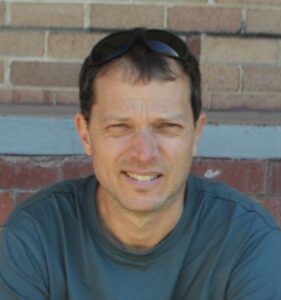
Dr. Francois Teste acquired his B.Sc. in Biological Sciences at the University of Montreal, a M.Sc. in Soil Ecology at Simon Fraser University and a Ph.D. in Forest Sciences at the University of British Columbia. Francois then completed a Post-doctoral in Forest Ecology at the University of Alberta and was hired as a research associate at the University of Western Australia, where he studied the ecophysiology of native plants growing in dry shrublands. He was soon promoted to research assistant professor, focusing on studying plant-soil feedback processes and root ecology in nutrient-poor soils. In 2015, he accepted a position at the National Scientific and Technical Research Council of Argentina, where he focused on invasive plant biology and soil microbial ecology. Since November 2021, Dr. Teste has been a research scientist at Agriculture and Agri-Food Canada (AAFC) in Swift Current leading the soil microbiology lab in aiming to enhance sustainable agricultural practices. He is currently focused on improving soil health and using nature-based approaches to return productivity and sustainability to cropland, marginal land and native grasslands.
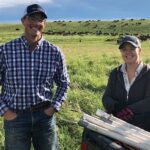
Mark and Laura Hoimyr own and operate Box H Farm in Gladmar, SK. Mark, Laura and their family run a 300 cow-calf operation and direct-market grass-fed beef, pastured pork and honey. Over the past 20 years, their farm has evolved from a conventional mixed grain and cattle operation to a forage-based business that focuses on the health of the land to grow nourishing food.
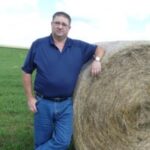
Kevin Steinley, along with his brother and family, operate a cow-calf operation at Rush Lake, SK. The utilization of irrigated forage resources plays a big role in their operation. Because of this, he is keenly aware of the importance of accelerating forage research to improve the forage resources available to livestock producers, especially during times of drought. He is also the executive director of the Swift Current Creek Watershed and vice president of the Saskatchewan Forage Council. Kevin is excited about the opportunity to be a mentor to a forage researcher to help improve the business of forage and livestock production in Canada.
Mentee: Dr. Rodolpho Martin do Prado
Mentors: Stan Christensen and Diane Allard

Dr. Rodolpho Martin do Prado has been passionate about ruminants and beef cattle production since his early years as an undergraduate in animal science at Universidade Estadual de Maringá (UEM) in Brazil. His studies were undertaken in Brazil, but he has had opportunities to collaborate with Canadian and British researchers for his master’s, Ph.D., and post-doc. After four years as a faculty lecturer at UEM, he secured a position in ruminant nutrition at Federal University of Rio Grande do Sul (UFRGS) in Brazil in 2022 and a position in beef cattle and meat quality at Université Laval in Quebec. With the objective of developing a strong research program connected to the needs of society, he moved to Canada with his family and has been an assistant professor at Laval since January 2023. Rodolpho has experience in beef production, especially in feedlot, and meat quality, having published 45 peer-reviewed papers on ruminant production. His mission as an academic is to promote beef production so that people around the world have nutritious and safe food, regardless of their economic conditions.
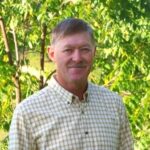
Stan Christensen, alongside his wife Cheryl and two sons, Ian and Eric, own and operate Ferme Sage along the Gatineau River near Lac-Sainte-Marie, QC. Originally from New Brunswick, Stan decided to take up roots in the area after meeting his wife on a ski trip nearby. At Ferme Sage, the Christensens oversee 86 hectares of owned land and 235 hectares of rented land along with 120 purebred Red Angus cattle. Stan prioritizes sustainable practices which includes a long history of grazing cattle and preserving biodiversity. As a result, Ferme Sage was the Quebec nominee for the 2023 Environmental Stewardship Award. Stan was also president of the Canadian Angus Association in 2000.

Diane Allard, a M.Sc. agronomist, has been a member of the Ordre des agronomes du Québec since 1992. As a visiting professor, she has been teaching bovine genetics at Université Laval for more than 20 years. Since 1999, she has published more than 80 documents as an animal production advisor at the Ministry of Agriculture, Fisheries and Food in Quebec. She is also provincial lead of the Agri-Réseau beef cattle webpage. In 2017, she received the Agronomic Distinction Medal for her exceptional contribution to the management of parasites in grazing cattle, and in 2018 obtained the SPGQ Excellence Award for this same project.
Mentee: Dr. Stephanie Lam
Mentors: Tammi Ribey and Betty-Jo Almond

Dr. Stephanie Lam grew up knowing Canada is full of opportunities, especially in agriculture. She completed her Ph.D. studying beef cattle feed efficiency and functional genomics, then completed her post-doc at AAFC in meat and carcass quality and was the agriculture program officer for Genome Alberta. She is currently a research associate at the University of Guelph studying more environmentally and economically sustainable approaches for beef production using -OMICs technologies. -OMICS technologies look at the function of genes, mRNA, proteins and metabolites for many agricultural and medical purposes. Beef cattle researchers use it to better understand an animal system, test for certain diseases and detect genetic markers aid in livestock selection for specific production goals.

Tammi Ribey has been a mixed animal veterinarian for 35 years and a practice owner for 25 years. Her entire career has been spent in the Bruce County, ON, area. Tammi’s time is spent with dairy herds, beef cow-calf operations and small animals. In addition to her practice, Tammi operates a 500-acre cash crop and purebred herd of 50 Angus mother cows, just outside of Paisley, ON, along with her husband Brain and two children, Steven and Kelsey. Currently, Tammi is chair of the Canadian Angus Foundation with past positions as president of the Canadian Angus Association, chair of the 2018 Canadian Beef Industry Conference, president of Ontario Angus and a 4-H leader.

Betty-Jo Almond is originally from a commercial beef operation in Eastern Ontario. She graduated from the University of Guelph with an agriculture degree, majoring in animal genetics. More recently, she is a graduate of the Advanced Agriculture Leadership Program that focuses on experiential executive leadership. Prior to working at AgSights, she was the program lead for several risk management programs, developing a strong understanding of both business and IT needs, abilities and limitations. Betty-Jo has been with AgSights for more than 10 years in various roles related to management solutions and services for beef, sheep, goat, and small- to medium-sized meat processing businesses. Betty-Jo represents AgSights on the AlphaPhenomics board, specializing in providing disruptive technology solutions for the livestock production industry, veterinarians and processors.
Click here to subscribe to the BCRC Blog and receive email notifications when new content is posted.
The sharing or reprinting of BCRC Blog articles is welcome and encouraged. Please provide acknowledgement to the Beef Cattle Research Council, list the website address, www.BeefResearch.ca, and let us know you chose to share the article by emailing us at [email protected].
We welcome your questions, comments and suggestions. Contact us directly or generate public discussion by posting your thoughts below.
